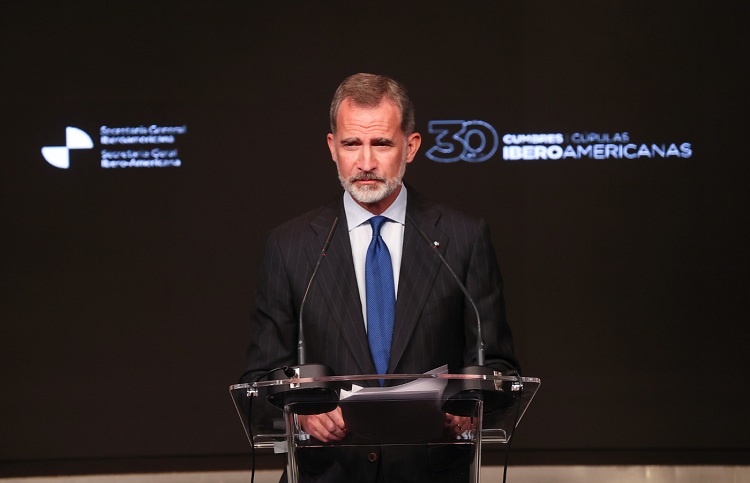The Diplomat
The defense of democracy, the fight against pandemics, economic recovery and climate change took center stage yesterday at the headquarters of the Casa de America in Madrid at the commemorative ceremony of the 30th anniversary of the Ibero-American Summits, which was attended by eight heads of state and government of the region, including King Philip VI, the President of Portugal, Marcelo Rebelo de Sousa, and the President of the Government, Pedro Sánchez.
The celebration of the 30th anniversary of the Ibero-American Summits is “a good opportunity to make better known what we have achieved together for three decades” and to “analyze the challenges that are pressing and that require us to find solutions in the coming years, to listen to the demands of our societies to which we will have to respond and, above all, to reflect on the future of our Ibero-American Community with the aim of continuing to promote its construction,” said Philip VI during the closing ceremony, which was conducted by the president of the EFE Agency, Gabriela Cañas.
“We must, above all, take advantage of this celebration to express our pride in being Ibero-Americans and our commitment to move forward together more and more, sharing the road, towards a future that in so many ways will be common,” he continued. “In doing so, we will be fulfilling what we agreed in the Declaration of Guadalajara by expressing our will to contribute together to a common future of peace, greater well-being and social equality,” he added.
For his part, the President of the Government, Pedro Sánchez, stated during the inauguration that one of the great challenges of the Ibero-American Community is “the settlement, consolidation and advancement of democracies”, because “democracy, respect for the social state and the rule of law, human rights, legal security, institutionalism and freedoms are tasks that summon us all”.
“These values, which we sometimes take for granted, require constant and absolute dedication” and, in this sense, “there is still much to be done in this regard in our region”, continued Pedro Sánchez, without mentioning specific cases. The Ibero-American Summits are the right place for this work because they constitute “a particularly valuable forum, above and beyond ideologies and governments of the day, which we must preserve, protect, care for and enrich for future generations,” he warned.
Duque and Piñera
The inauguration was followed by two panels with the participation of the presidents of the countries that have hosted at least two Ibero-American summits to date. In the first panel, entitled Achievements of the summit system in 30 years and moderated in person by the former first Ibero-American Secretary General Enrique V. Iglesias, the President of Colombia, Iván Duque, denounced (by videoconference) that “the greatest migratory crisis in the world” is in Ibero-America, with “more than six million Venezuelan brothers and sisters throughout the continent”. For this reason, he warned, “we need a great social and economic diplomatic response to this situation” and to defend democracy, which is “at risk of democracy in Latin America and requires special attention”.
In the same panel – in which the Vice President of the Dominican Republic, Raquel Peña, also took part in person, and the Portuguese Minister of Foreign Affairs, Augusto Santos Silva, virtually – the President of Chile, Sebastián Piñera, also called attention to the need to remain “always alert and never lower our guard in the defense of the values of freedom, democracy and human rights”. “Before, the enemies of democracy and human rights were the coup plotters, but now, many times, the enemies conquer power democratically and decide to destroy from within the democracy that allowed them to come to power,” added Piñera via videoconference.
Fernández, Abinader, Cortizo and Rebelo de Sousa
In the second panel, also moderated in person by former Ibero-American Secretary General Rebeca Grynspan and dedicated to the challenges facing the Ibero-American community of nations (and in which all the participants intervened virtually, except Pedro Sánchez), the President of Argentina, Alberto Fernández, warned of the need to “rethink the international financial architecture” so that middle-income countries, including Ibero-American countries, can “access foreign financing”, and defended the intensification of relations with the European Investment Bank (EIB), a challenge in which “Spain and Portugal play an essential role because they are our ports of entry into the EU”.
For his part, the president of the Dominican Republic, host country of the next Summit in 2022, Luis Abinader, warned that the “environmental dimension is now as important as the social and economic ones, because we cannot sustain a planet that devours its resources and its people”. For this reason, he defended an “alliance for a just transition” because “it cannot be that those of us who contribute the least to global warming have to assume the greatest costs”.
Likewise, the President of Panama, Laurentino Cortizo, took advantage of his speech to present a “concrete proposal” to fight COVID in the region: that the Ibero-American General Secretariat (SEGIB) implement an Ibero-American mechanism, “through COVAX or whatever SEGIB determines”, for the “joint donation of vaccines to Ibero-American and Caribbean countries that are extremely behind in the vaccination process”, which would represent a form of “solidarity in addition to that of other countries, such as Spain”.
As a prelude to the closing ceremony, the President of Portugal, Marcelo Rebelo de Sousa, affirmed that the Ibero-American Community must take advantage of the Spanish and Portuguese languages, which represent “a demographic power present in all continents”, to “be more powerful in the world” and act “together” in the fight against pandemics through a “future global pandemic prevention treaty”, in the creation of “permanent structures for future vaccinations”, in the promotion of “economic recovery and social inclusion” and in the defense of “joint positions” on digital issues, energy transition and climate.






